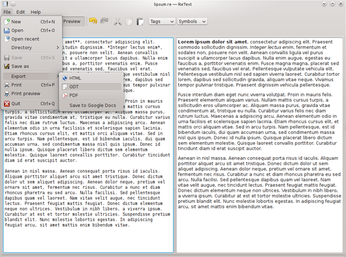ReText: A Text Editor with Support for reStructuredText and Markdown

Productivity Sauce
ReText is a nifty text editor for those who appreciate markup systems like reStructuredText and Markdown. The application allows you to easily create formatted texts using either reStructuredText or Markdown markups, and then output the result in several formats including ODF, PDF, and HTML. In addition to that, you can upload formatted documents to Google Docs directly from within the editor. ReText boasts other handy features, including HTML syntax highlighting, auto save option, and support for CSS styles. The editor sports a tabbed interface, so you can manage multiple text files, while the Preview pane lets you view the formatted output of the currently edited file. The Tags and Symbols drop-down lists allow you to quickly insert often-used HTML tags and symbols like em dash, right and left arrows, dot, etc. Like any text editor worth its salt, ReText supports a simple find feature as well as undo and redo operations. The only missing piece here is the lack of word count and line numbering features.
ReText is written in Python, and the text editor requires no installation. However, it depends on a handful of packages, including python-qt4, python-markdown, python-docutils, and python-gdata. These packages are available in the software repositories of most mainstream Linux distributions, so you can easily install them using your distro's package manager. Grab then the latest release of ReText and unpack the downloaded archive. Make the retext.py file in the resulting directory executable using the chmod +x retext.py command, and launch the editor by running the ./retext.py command (or double-click on the retext.py file in the file manager).
Users of Ubuntu-based distributions can install ReText via a dedicated PPA:
sudo add-apt-repository ppa:mitya57/ppa sudo apt-get update sudo apt-get install retext
Comments
comments powered by DisqusSubscribe to our Linux Newsletters
Find Linux and Open Source Jobs
Subscribe to our ADMIN Newsletters
Support Our Work
Linux Magazine content is made possible with support from readers like you. Please consider contributing when you’ve found an article to be beneficial.

News
-
Keep Android Open
Google has announced that, soon, anyone looking to develop Android apps will have to first register centrally with Google.
-
Kernel 7.0 Now in Testing
Linus Torvalds has announced the first Release Candidate (RC) for the 7.x kernel is available for those who want to test it.
-
Introducing matrixOS, an Immutable Gentoo-Based Linux Distro
It was only a matter of time before a developer decided one of the most challenging Linux distributions needed to be immutable.
-
Chaos Comes to KDE in KaOS
KaOS devs are making a major change to the distribution, and it all comes down to one system.
-
New Linux Botnet Discovered
The SSHStalker botnet uses IRC C2 to control systems via legacy Linux kernel exploits.
-
The Next Linux Kernel Turns 7.0
Linus Torvalds has announced that after Linux kernel 6.19, we'll finally reach the 7.0 iteration stage.
-
Linux From Scratch Drops SysVinit Support
LFS will no longer support SysVinit.
-
LibreOffice 26.2 Now Available
With new features, improvements, and bug fixes, LibreOffice 26.2 delivers a modern, polished office suite without compromise.
-
Linux Kernel Project Releases Project Continuity Document
What happens to Linux when there's no Linus? It's a question many of us have asked over the years, and it seems it's also on the minds of the Linux kernel project.
-
Mecha Systems Introduces Linux Handheld
Mecha Systems has revealed its Mecha Comet, a new handheld computer powered by – you guessed it – Linux.


Using Markdown as an input for Slideshow - s6 and s9